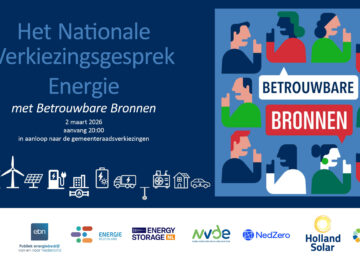Update processing requirement for industrial batteries including home batteries
Summary
- Due to financial risks, establishing a collective producer organization for industrial batteries, including home batteries, is not yet a good option in the short term;
- The Netherlands is late in implementing the Battery Regulation, which means producers are not yet able to properly meet their obligations even individually;
- Holland Solar, ESNL and the OPEN Foundation are in talks with the Ministry of I&W to come up with practical solutions;
- In the meantime, companies marketing industrial batteries can best prepare by keeping full records of information on imports and sales of industrial batteries, including home batteries.
Background
Earlier this year, we shared information on the impact of the European Battery Regulation on manufacturers and importers (hereafter "producers") of industrial batteries, including home batteries. This includes an obligation for all producers to organize and finance collection and processing of end-of-life products as of August 18, 2025. Last spring, Holland Solar and ESNL jointly collected input from supporters. This showed that members of both association prefer a collective solution. This is the basis for the efforts of Holland Solar and ESNL. The collective system would ideally be run by the OPEN Foundation, which already does this for solar panels. See here for the full position paper.
Collective solution producer responsibility
The commitment of Holland Solar, ESNL and the OPEN Foundation is to arrive at a collective solution for industrial batteries. The preference here is for a collective system for batteries up to a maximum weight to be determined (home batteries). In fact, due to their high weight, a system that includes megawatt batteries would create an undesirable financial risk for the producer organization. If a collective producer organization exists, it would, however, become possible for producers of these large parks to make arrangements with this producer organization for the collection and processing of the batteries. However, this would then be financed not through an upfront disposal fee, but through an ex-post agreement.
Before a collective system can be set up, however, agreements must first be reached with the government on the interpretation and enforcement of the Battery Regulation in the Netherlands. Indeed, legal advice obtained by the OPEN Foundation indicates that while it is now possible to make a collective application limited to batteries with a certain maximum weight or chemical composition, if approved, the obligation for collection and processing would still apply to all industrial batteries. Without delineation of that obligation, however, the financial and legal risk for the producer organization becomes unmanageable.
Holland Solar, ESNL and the OPEN Foundation are making efforts, in consultation with the Ministry of I&W and Rijkswaterstaat, to clarify the interpretation of the regulations as soon as possible in order to work on a collective interpretation of producer responsibility
Implementation of Battery Ordinance by Public Works Department delayed
Because a European regulation such as the Battery Regulation becomes directly Dutch law, companies have legally binding duties starting Aug. 18 - even if implementation by the Dutch government is delayed. These obligations are:
- Registration in the Batteries Register: Every producer must be registered individually in the Batteries Register that is yet to be established. Rijkswaterstaat will be the administrator of this register and will carry out the registration obligations. Collective producer organizations such as the OPEN Foundation can pass on the producers affiliated with them, simplifying registration for both companies and Rijkswaterstaat.
- Approval procedure: Each producer or, if present, collective producer organization must apply for approval to place batteries on the market. This must include all kinds of general information, but also, for example, a waste management plan.
In all member states of the European Union, it appears that the implementation of the Batteries Regulation is considerably more complex than expected. The Dutch implementation legislation of the Batteries Regulation will not be ready by August 18, 2025. In the Netherlands, among other things, Rijkswaterstaat has not yet finished the implementation of the Batteries Register, in which all producers will have to register.
Registration in the Batteries Register (obligation 1) is therefore not possible at this time. In the absence of a collective system, an individual approval procedure per company is mandatory. This too (Obligation 2) is currently seen as risky: an individual producer is in fact not only held responsible for his own industrial batteries after approval, but also has to take back all other industrial batteries placed on the market by other producers and presented to him free of charge and have them processed. He can then, however, try to charge these costs to the original producer. However, given the long life expectancy of industrial batteries, this will be a very cumbersome process and thus a great financial risk.
The OPEN Foundation, Holland Solar and ESNL, in consultation with the Ministry of Infrastructure and Water Management and the Department of Waterways and Public Works, are making efforts to arrive at a solution that enables a collective fulfillment of producer responsibility for the industrial battery category through segments, especially the home battery segment.
What can companies do now?
Because for industrial and home batteries a collective application is not a good option for the time being, in principle every producer and importer would have to register themselves in the Batteries Register, submit an individual Application for Approval including a waste management plan, and make financial provisions for the processing of batteries returned to them. However, the delay in implementing the Battery Regulation in the Netherlands means that registration in the Batteries Register is not yet possible, and individual approval applications are risky.
In coordination with Holland Solar and ESNL, the OPEN Foundation is therefore in discussions with the Ministry and Rijkswaterstaat to reach practical solutions. Among other things, the OPEN Foundation has urged the Ministry and Rijkswaterstaat to postpone the registration date and the Approval Procedure to January 1, 2026, as is already the case in many other EU member states.
Meanwhile, we strongly advise companies marketing industrial batteries to prepare for registration in the Batteries Register by keeping all relevant information on the import and sale of industrial batteries in their own records.
Questions
- General information about the Battery Ordinance on the Department of Public Works website:
- For questions and comments on Holland Solar and ESNL's efforts: Maaike Beenes, senior industry specialist, maaike.beenes@hollandsolar.nl, 0644844834





